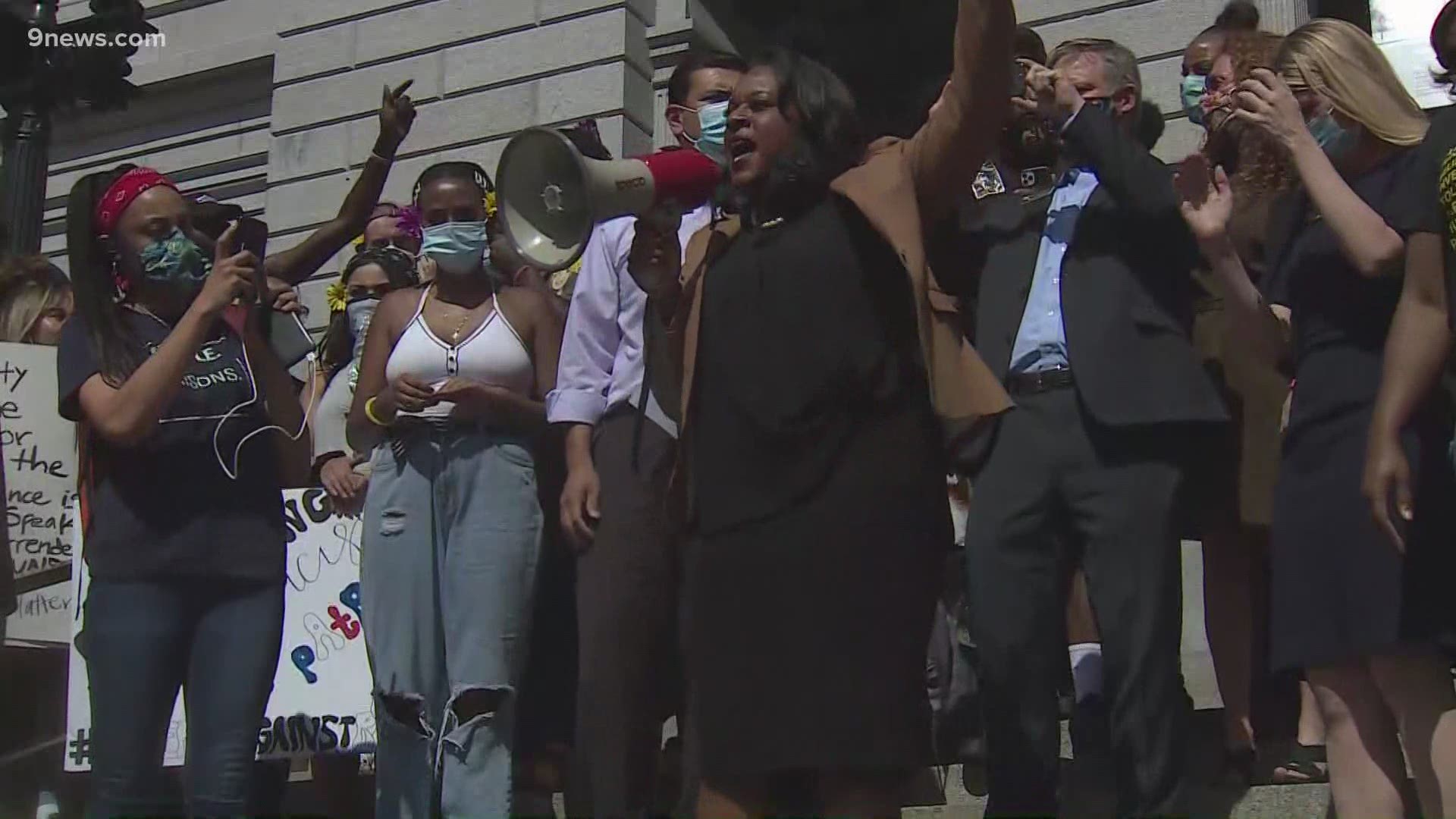DENVER — Eleven days into the Denver protests for police reform after the in-custody death of George Floyd in Minnesota, the city's police department announced its first policy changes. While community leaders and advocates can acknowledge the changes are a step in the right direction, they also say the department has a long way to go.
"The protesters have made a huge difference in moving the needle in ways that none of us could have expected," Colorado State Representative Leslie Herod told 9NEWS on Monday.
Denver Police Department's (DPD) three policy changes include:
- No exceptions to the ban on chokeholds.
- Denver Metro SWAT body cams must be recording during tactical operations.
- Officers must now file a report anytime they intentionally point their gun at a person.
"I should start by saying I don't want to minimize how important those changes are," said Elisabeth Epps, abolitionist and founder of the Colorado Freedom Fund, an organization that posts money bond and cash bail for people who can't afford it.
"It’s important to be very clear that Chief Pazen did not do this out of the goodness of his heart," Epps said of the Denver Police Chief Paul Pazen. "We as a community have been asking for these changes for years.
"We aren’t in the business of asking for things that don’t matter, so I completely acknowledge that they are meaningful changes – particularly concerning the chokehold," she said. "But they aren’t enough and we [the community] take credit for them."
Herod and Epps, two prominent leaders for police reform in Colorado, expect much more than the recent announcement from the Denver Police Department, and soon.
"It's just one step," Herod said. "I want to make clear that there are more steps that are necessary."
Right away, both women said they would like to see public support from DPD on Senate Bill 20-217, a major police accountability bill.
"It’s really important that DPD steps up and supports 217," Herod said. "For them not to speak up on what their fellow officers are doing in other jurisdictions is not okay. We need their support on this bill and we need it today."
In a statement from DPD on Monday, the department said it does not comment on pending legislation.
While a compromise on SB 20-217 passed Monday extending the deadline for law enforcement to adopt body cams until 2023, both women would like to see their local police department and Pazen act much sooner.
"Right now, as far as body cams," Epps said, "there's no reason that Denver with its obscene surplus of money in the policing department and in the department of safety is not requiring body cams all the way up through the chain of command.
"If they’re going to have them," Epps continued, "all officers should have them. Anyone who is going to be interacting with any member of the public should be wearing them," she said, with Herod echoing the same sentiment.
"It's so important that we don't have a long list of exemptions for when someone has their body camera on or not," Herod said. "If they're on duty, their body camera should be on."
Both women want to see officers held accountable for this.
"The discipline matrix needs to be much, much more strict in terms of how many chances an officer gets to conveniently "forget" to turn his or her camera on," Epps said.
"I understand technological failures can occur, but when it comes to disabling a body camera – there should not be room really for a second chance on that," she said. "These folks didn’t get a second chance and we should be holding our officers to that same standard."
In that same vein, Herod would also immediately like to see DPD hold officers accountable who have a record of excessive force.
"We need to make sure that we hold them accountable across the entire state," she said. "If they are bad actors, they should not be able to just transfer their experience on the force into another department."
Finally, Epps spoke bluntly about her most pressing request for the chief in light of the response to the earlier protests in Denver.
"My number one ask is that he needs to cease using chemical gas weapons on humans," Epps said. "DPD should not be in the business of gassing Denverites, our citizens, our neighbors, our residents or our visitors.
"I think it is the moment for that change," Epps said. "I think it is shameful what has happened on his watch."
Denver Police Chief Paul Pazen has plans to respond in an interview with 9NEWS Tuesday.
SUGGESTED VIDEOS: Local stories from 9NEWS

